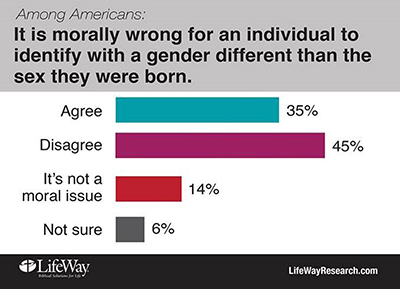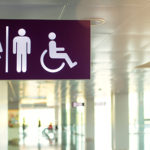WASHINGTON (RNS)—A survey of 1,000 Americans by LifeWay Research finds six in 10 Americans don’t believe it is morally wrong for people to identify with a gender different from the sex they were assigned at birth.
And more than half don’t think it’s morally wrong to change one’s body to match his or her gender identity by taking hormones or having surgery.
“A majority of Americans reject the view of a creator giving them a gender that shouldn’t be changed,” LifeWay Executive Director Scott McConnell said.
But those numbers shift sharply among evangelicals, the survey revealed. Fifty-four percent of evangelicals believe it’s morally wrong to identify with a different gender.
That’s significantly higher than among Catholics (26 percent), members of other religions such as Judaism and Islam (35 percent) and the nonreligious (20 percent).
In addition, evangelicals are almost twice as likely (61 percent) as nonevangelical Americans (32 percent) to say using surgery or hormones to transition from one gender to another is wrong.
The survey comes as several states have introduced legislation that would require people to use public restrooms corresponding to the sex they were assigned at birth. And the murder of 49 people last month at Pulse, a gay nightclub in Orlando, Fla., has highlighted concerns LBGT people still are not safe and religious teachings may be a contributing factor to hatred toward them.
 Among all Americans, 35 percent say it’s morally wrong for people to identify with a gender different from the sex they were assigned at birth, while 45 percent say it is not wrong, and 14 percent say it is not a moral issue, the LifeWay survey showed. When it comes to transitioning, 42 percent say it’s morally wrong, while 43 percent disagree.
Among all Americans, 35 percent say it’s morally wrong for people to identify with a gender different from the sex they were assigned at birth, while 45 percent say it is not wrong, and 14 percent say it is not a moral issue, the LifeWay survey showed. When it comes to transitioning, 42 percent say it’s morally wrong, while 43 percent disagree.
Another 11 percent say transitioning is not a moral issue, which McConnell said reflects “a changing worldview.”
“A growing percentage of Americans don’t believe in right and wrong. They don’t believe there’s absolute truth—and if there’s no absolute truth, then they’re reluctant to talk about morality,” McConnell said.
Christians as a whole, both Protestant (22 percent) and Catholic (23 percent), also are least likely to say they know a transgender person, which affects one’s beliefs about the morality of being transgender, LifeWay discovered.
Among the 27 percent of all Americans who say they know someone who is transgender, 25 percent say identifying with a different gender is wrong, and 28 percent say transitioning is. Those numbers are higher among people who have no transgender acquaintances: 39 percent say it is wrong to identify with another gender, and 48 percent say it is wrong to transition.
The telephone survey was conducted Sept. 14-28 and had an overall margin of error of plus or minus 3.6 percentage points, according to LifeWay. Margins of error in subgroups were higher.















We seek to connect God’s story and God’s people around the world. To learn more about God’s story, click here.
Send comments and feedback to Eric Black, our editor. For comments to be published, please specify “letter to the editor.” Maximum length for publication is 300 words.